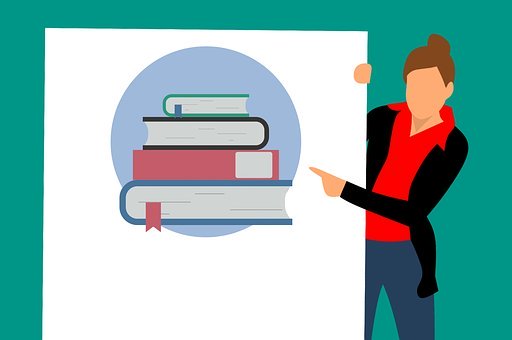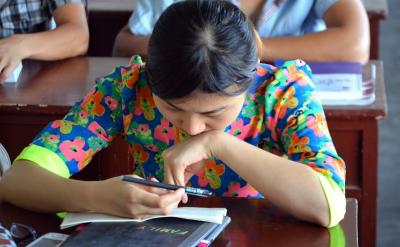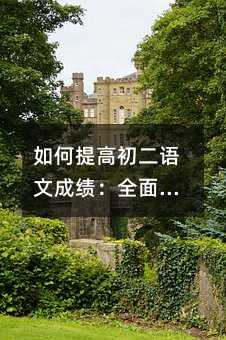中考英语完形填空技巧攻略

篇1:中考英语完形填空技巧攻略
It was very cold that day. It was __1__ heavily and the ground was covered with __2__ snow. The shepherd thought it was dangerous to __3__ the hill and it was difficult for the sheep to find some __4__ there. So he decided to stay in the __5__ room. He put some hay(干草) in a pen(围栏) __6__ the sheep could eat it when they were __7__. The dog, who felt cold outside, lay on the __8__ hay and soon went to sleep.
At noon the sheep wanted to eat the hay. They were __9__ afraid of the dog and __10__ could get close to it. At last the __11__ sheep came to the hay. Before he started to eat, the dog heard it and opened his eyes. He barked(吠) loudly to __12__ him. The sheep ran away __13__. Looking at the unnatural(不近人情的) dog, the sheep began to talk __14__.
“What a selfish(自私的) dog!” said one of the sheep. “He cannot eat the hay, and yet refuses to __15__ those who can to eat!”
1. A. raining B. snowing C. blowing D. shining
2. A. thick B. thin C. beautiful D. big
3. A. play on B. live on C. climb up D. go to
4. A. cake B. grass C. fruit D. vegetables
5. A. cold B. cool C. hot D. warm
6. A. in order to B. so as to C. so that D. in order
7. A. hungry B. sick C. full D. free
8. A. hard B. soft C. thin D. wet
9. A. both B. either C. all D. neither
10. A. none B. neither C. any D. some
11. A. smallest B. youngest C. weakest D. strongest
12. A. meet B. greet C. warn D. receive
13. A. easily B. happily C. sadly D. quickly
14. A. angrily B. happily C. quietly D. politely
15. A. let B. ask C. forget D. allow
名师点评
本篇是一个寓言故事,说的是一只牧羊犬,因为天冷,就睡在牧羊人给羊吃的干草上。结果,羊吃不着草,感到非常生气,他们认为狗太自私,自己又不能吃草,还不让能吃草的吃。
答案解析在下一页
1. B。从下文可知天是在下雪。
2. A。上文说天在下着大雪,所以地上应该被覆盖着“厚厚的”雪。
3. C。可能有同学会选go to the hill,但比较climb up the hill,后者更符合常理。意为“在这种天气下爬上山是很危险的。”
4. B。根据常理,羊在那儿也很难找到草。
5. D。天冷,牧羊人就想呆在温暖的房间里。英语里一般不用hot room。
6. C。后面是一个完整的句子,所以不可以用in order to或so as to。so that意为“以便”,后面得跟一个完整的句子。
7. A。全句意为“牧羊人把干草放在围栏里以便羊在饿的时候能吃”。
8. B。躺在软草上,用soft最恰当。
9. C。羊都很害怕狗。“三者以上的都”只有用all。 #p#分页标题#e#
10. A。没有一只羊能接近它。
11. D。最终也只有最强壮的羊敢上前去。小的、弱的哪有这个胆量?
12. C。狗大声叫,是想警告羊。绝不是去问候它。
13. D。羊只好赶紧离开,其他副词都不妥当。
14. A。不敢去吃草,只好私下里很气愤地谈论。
D。本句可能有同学会选let,但注意后面有to eat ,没有let sb. to do sth的说法.,但是有allow sb to do sth.,意为“但还不允许能吃的去吃(草)。
篇2:中考英语完形填空技巧攻略
Martin Henfield talks about some of his experience(经历) as a twin: when we were small my mother dressed us __1_ the same clothes. That was bad enough and we didn’t like it. But we went on our first camping trip, it was even __2__. We were only ten years old, and while __3_ went into their sleeping bags for the _4__, we were not happy to snuggle(偎依) inside a double sleeping bag my mother made for us.
At school our classmates __5__us Henfield One and Henfield Two, so people ___6__ even see our difference according to our initials because __7__ of us were M.O. It was only when I went to _8___ and began to have my own friends that I started to feel my own freedom of identity(身份).
Before I went to college, during my secondary school __9__, I __10__ to a job on a building site. My twin brother, Mike Henfield, didn’t work. One day I asked my boss, “Can I have a week _11__?” “Certainly,” he said, “but you won’t have the job when you 12__ back.” I didn’t want to __13__ the job. So on Monday morning, Mike went there in my _14__, jacket and hat and he worked for me for one week __15___ of them knew the difference.
1. A. in B. for C. on D. with
2. A. badder B. worse C. good D. better
3. A. all boys B. another boy
C. all the other boys D. all the boys
4. A. day B. holiday C. night D. mid-night
5. A. called B. knew C. told D. made
6. A. didn’t B. needn’t C. mustn’t D. couldn’t
7. A. very B. each C. both D. all
8. A. middle school B. college C. high school D. school
9. A. holidays B. week C. weekend D. holiday
10. A. received B. got C. find D. made
11. A. off B. free C. on D. back
12. A. came B. will get C. got D. are
13. A. miss B. lose C. lost D. losing
14. A. coat B. shirt C. shoes D. trousers
15. A. None B. Nobody C. All D. Each
名师点评
这是一则关于双胞胎的故事, 说明了作为双胞胎既有他们苦恼的一面, 也有乐趣的一面. 在做这则完型填空时, 只要抓住双胞胎非常相像这一特点, 就很容易理解其中发生的事情了。
答案解析在下一页:
1. A。“给某人穿(衣服)”应为dress sb. in。
2. B 根据下文可知野营中的情况比平时更糟糕.。
3. C。the other加名词复数表示“剩余的所有的人”。
4. C。睡袋应用于夜间。
5. A。“称呼某人……”用call sb. …。
6. D。
7. C。根据后面的系动词were, 应用both表复数。
8. B。根据上下文可知, 直到大学, 这种情况才有所改变。
9. D。指中学生涯的最后一个假期。
10. B。“找到一份工作”可用get/find a job, 但此处应用过去时。 #p#分页标题#e#
11. A。have a week off 休息一个星期。
12. D。只有D项时态正确。
13. B。
14. D。
15. A。没有一个人看出这时双胞胎交换了一下。B项不可带of。

篇3:中考英语完形填空技巧攻略
Who designed (设计) the first helicopter (直升飞机)? Who __1__ of the most famous pictures in the world? Who knew more about the human body than most __2__? There is an answer __3__ all these questions --- Leonardo de Vinci (达芬奇).
Leonardo may have been the greatest genius (天才) __4__ have ever known. He lived in Italy around the year 1500, but many of his inventions seem modern to us today. For example, one of his notebooks has drawings of a helicopter. Of course, he couldn’t __5__ a helicopter with the things he had. But scientists say his idea would have worked.
But Leonardo __6__ an inventor. He was one of the greatest artists of his day. By the time he was twenty years old, he was called a master ( 大师) painter, and as he got older he became __7__ more famous. Sometimes he drew a hand ten different ways __8__ he was ready to paint.
Many of Leonardo’s wonderful paintings are still with __9__ today. You may know one of his most famous works the __10__ woman known as the Mona Lisa.
1. A. took B. made C. painted D. invented
2. A. artists B. doctors C. painters D. people
3. A. to B. of C. for D. from
4. A. the scientists B. the artists C. the world D. people
5. A. draw B. paint C. work D. build
6. A. was just B. wasn’t just C. wasn’t D. was no longer
7. A. less B. no C. even D. very
8. A. before B. after C. because D. when
9. A. him B. us C. them D. you
10. A. interesting B. crying C. smiling D. surprising
名师点评
本文介绍了堪称世界上最伟大的天才——达?芬奇在发明、艺术等方面为人类所作的巨大贡献,文章层次分明,通俗易懂。
答案解析在下一页》》
1.C。为了引出话题人物━━达?芬奇,这里引用了设问手法,问题应表示“是谁画了世界上最著名的画”,故选择动词painted。
2.B。对人体比较了解的莫过于医生了,将达?芬奇与医生相比才能显示其对人体的精通。故选择doctors。
3.A。介词to常表示一一对应的关系,“问题的答案”习惯表达为an answer to a question。
4.D。达?芬奇应是世人所知道的天才中最伟大的人,the world 一般指每个人,相当于第三人称单数,故people为正确选项。
5.D。draw和paint不合文意, work为不及物动词,不能直接接宾语。在那个时代,达?芬奇所不能做的应是制造飞机,故选择build。
6.B。这一句起承上启下的作用,意为“达?芬奇不仅仅是一名发明家”,故选择 wasn’t just。
7.C。less和no不合文章,very不能用来修饰比较级,而even常用来修饰比较级,意为“甚至更……”,故为正确选项。
#p#分页标题#e#
8.A。为了使自己的画达到最高境界,应在画这幅画之前去尝试不同的画法,所以应选before。
9.B。达?芬奇的画今天依然保存在世,为本文作者以及读者所共享,所以应选us。
10.C。达?芬奇的名作━━Mona Lisa以画中人物面部神秘的微笑而名扬天下,故选smiling。

篇4:中考英语完形填空技巧攻略
Peter’s job was to examine cars when they crossed the frontier to make sure that they were not smuggling anything into the country. Every evening he would see a factory worker coming __1__ the hill towards the frontier, __2__ a bike with a pile of goods of old straw on it. When the bike __3__ the frontier, Peter would stop the man and __4__ him take the straw off and untie it.
Then he would examine the straw very __5__ to see __6__ he could find anything, after which he would look in all the man’s pockets __7__ he let him tie the straw again. The man would then put it on his bike and go off down the hill with it. Although Peter was always __8__ to find gold or other valuable things __9__ in the straw, he never found __10__. He was sure the man was __11__ something, but he was not __12__ to think out what it could be.
Then one evening, after he had looked __13__ the straw and emptied the worker’s pockets __14__ usual, he __15__ to him, “Listen, I know you are smuggling things __16__ this frontier. Won’t you tell me what it is? I’m an old man, and today’s my last day on the __17__. Tomorrow I’m going to __18__. I promise I shall not tell __19__ if you tell me what you’ve been smuggling.” The worker did not say anything for __20__. Then he smiled, turned to Peter and said quietly, “Bikes.”
1. A. towards B. down C. to D. up
2. A. filling B. pulling C. pushing D. carrying
3. A. arrived B. appeared C. came D. reached
4. A. ask B. order C. make D. call
5. A. carefully B. quickly C. silently D. horribly
6. A. that B. where C. how D. whether
7. A. before B. after C. first D. so
8. A. lucky B. hoping C. thinking D. wondering
9. A. had been B. hidden C. hiding D. have been
10. A. nothing B. something C. everything D. anything
11. A. taking B. smuggling C. stealing D. pushing
12. A. possible B. strong C. able D. clever
13. A. through B. thoroughly C. upon D. up
14. A. like B. more C. then D. as
15. A. told B. cried C. ordered D. said
16. A. cross B. past C. across D. into
17. A. thing B. work C. job D. duty
18. A. rest B. back C. retire D. retreat
19. A. everyone B. anyone C. no one D. someone
20. A. moment B. long time C. sometime D. some time
名师点评
这篇完型填空讲述了身为边防检查员的彼得明知一个工厂工人在走私货物却无法抓住对方的把柄。在退休的前一天,彼得恳请其说出真相,结果令彼得恍然大悟。
答案解析在下一页
1.D。根据下文这个工人越过边界后,走下山坡,所以到达边界之前应在朝山上走。故选up。
2.C。这名工人是在推着一辆装有稻草的自行车,故选动词pushing。 #p#分页标题#e#
3.D。这里表达的是到达边界之意arrive, come为不及物动词不可直接接 the frontier,故选reached。
4.C。ask与order后接不定式的复合结构时,动词前应有to, make后接不定式的复合结构时,动词前to要省去。根据下文应选make。
5.A。彼得想发现这个工人在走私什么,所以应仔细地检查。故选carefully。
6.D。这里根据文意,应选择表示“是否”之意的whether作宾语从句的引导词。
7.A。根据常理,彼得应先检查这个工人的口袋才能让他捆起稻草走人,故选before。
8.B.根据文意,彼得心中一直怀着查获走私物品的希望,故选hoping。
9.B。这里things和hide之间是被动关系,现在分词hiding作定语时表示主动,所以应用过去分词hidden作后置定语表被动。
10.D。本句中否定词never及文意决定了这里应选 anything。
11.B。四个选项从语法上讲都可以,只能从文意上进行区分,smuggling意为“走私”,是正确选项。
12.C。固定结构be able to do sth. 意为“能够干某事”。
13.A。习惯用语look through 意为“彻底检查”。
14.D。“as usual”为固定短语,意为“象平常一样”。
15.D。tell, order后面应直接接人作宾语表示告诉某人和命令某人,而用say应为say to sb. 故said为正确选项。
16.C.这里应选择一个介词构成介词短语在句中做状语。介词past 表“经过”; across 强调“从一边到另一边”;而into 表示“进入到……里面”。 根据文意across应为正确选项。
17.C。“on the job”为一常用短语。意为“执行公务”。
18.C。因为今天是彼得最后一天上班说明明天他就要退休retire。
19.B。根据句中否定词not 及文意应选anyone。
20.D。本句说明这个工人回答彼得的问题之前沉默了一会儿。A选项应用a moment; C选项表示某一点时间; D选项表示一段时间或一会儿,为正确选项。

篇5:中考英语完形填空技巧攻略
Once upon a time, a rich man wanted to make a trip (旅行) to another town. He tried not only to take things to sell but also to take money to 1 things with. He 2 to take ten servants with him. They would 3 the things to sell and the food to 4 on their trip. Before they started, a little boy ran up to 5 and asked to 6 with them.
The rich man said to the little boy, “Well, 7 may go with us. 8 you are the smallest, the thinnest and the weakest of all my 9 , you can’t carry a 10 load (担子). You must 11 the lightest one to carry.” The boy thanked his master and chose the biggest load to carry. That was bread.
“You are 12 .” said his master, “That is the biggest and the heaviest one.” The boy said 13 and lifted the load gladly.
On the trip they walked for days and at last they got to the town. All the servants were tired 14 the little servant. Do you know 15 ? Most of the bread was eaten during the trip and a little was left when they arrived at the town.
1. A. eat B. buy C. change D. get
2. A. decided B. liked C. hoped D. tried
3. A. take B. bring C. carry D. borrow
4. A. cook B. eat C. buy D. drink
5. A. them B. the servants (仆人)
C. the road D. the rich man
6. A. stop B. stay C. go D. talk
7. A. you B. he C. I D. they
8. A. Since B. If C. Because D. But
9. A. family B. guests C. servants D. things
10. A. heavy B. light C. small D. difficult
11. A. eat B. choose C. pick up D. understand
12. A. brave B. right C. clever D. foolish
13. A. sorry B. nothing C. angrily D. good-bye
14. A. besides B. of C. except D. with
15. A. who B. him C. that D. why
名师点评
本文讲述了一个聪明的小男孩的故事。他要求加入一位富人的旅行,在得到同意后 选择担子时,看似愚蠢地选择了最大、最重的担子。而这恰恰就是他的聪明之处,因为他所挑的面包在途中是被边走边吃的,到达目的地时已所剩无几。阅读这故选foolish。篇文章时要注意句子的整体理解,如第8、9、10这三题。
答案解析在下一页
1. B。这位富人不仅带了东西去卖,而且带钱去“买”东西。解这道题时要注意将句中and前后的内容进行比较。
2. A。根据他的想法,他“决定”要带十个仆人。这件事完全可以由他自己决定,所以没有必要“希望带……”或“努力带……”,故C、D不合题意。
3. C。carry在句中意为“携带、运送”;take 意为“带走”;bring意为“带来”。本句意为“他们将运送要卖的东西和在路上要吃的食物”。下文的第10、11两题所在的句子也有提示。
4. B。参照第3题。 #p#分页标题#e#
5. D。一个小男孩来找这位富人,要求和他们一起走,故选 the rich man。
6. C。参照第5题。
7. A。富人同意小男孩随行。
8. D。此句和上文是转折关系,意为“但是你是我的仆人中最小的、最瘦的、最弱的一个,你不能挑重担”,故选but。
9. C。参照第8题。
10. A。参照第8题。
11. B。此句意为“你要选择挑最轻的担子”,“pick up”意为“捡起”,不合文意,故选choose。
12. D。主人看到这个小仆人选择了最重的担子,感到他很“愚蠢”,故选foolish。。
13. B。听了主人的话,小男孩“什么也没说”,而是高兴地挑起了担
子。
14. C。由于小男孩的聪明,“除了”他自己,其他仆人都累坏了。
15. D。Do you know why? 用在文章最后用来引出原因,告诉读者其中的奥妙。



